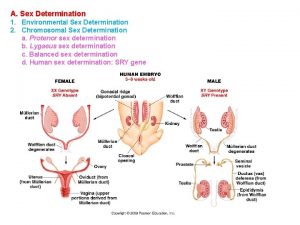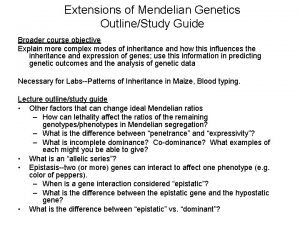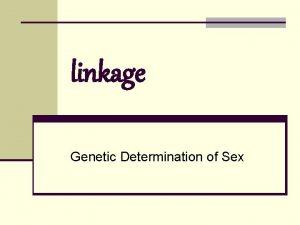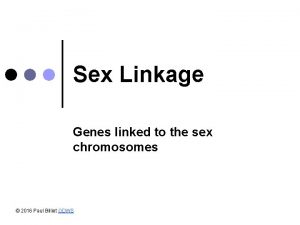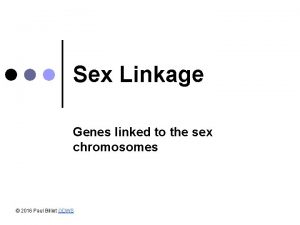Sex Linkage and Lethal Genes Sex determination Sex














- Slides: 14

Sex Linkage and Lethal Genes

Sex determination Sex in mammals is determined by two chromosomes, known as the sex chromosomes or heterosomes. The X chromosome is larger and contains about 2000 genes, whereas the Y chromosome contains fewer than 100. In humans: l Females (XX) are the homogametic sex. l Males (XY) are the heterogametic sex. 2 of 45 © Boardworks Ltd 2009

Sex linkage Genes are located on the sex chromosomes are described as sex linked. The study of their inheritance involves examining both the sex of the offspring and the genetic trait of interest. X-linked diseases Y-linked diseases Haemophilia Duchenne muscular dystrophy Red–green colour blindness Rare and debatable! It is argued that there is little room on the Y chromosome for anything other than genes controlling testes formation and function. 3 of 45 © Boardworks Ltd 2009

Sex linkage: X linkage is more common because: l the X chromosome is larger l part of it does not have a homologous section on the Y chromosome, therefore only one allele of a gene will be present and so will always be expressed. homologous regions do not carry sex-determining genes non-homologous regions carry sex-determining genes and other genes 4 of 45 © Boardworks Ltd 2009

Recognising a sex-linked trait Usually more males than females are affected. If a woman has the trait, all her sons have it. The characteristic often appears to skip a generation from grandfather to grandson. For a female to be affected her father must have the characteristic and her mother must at least be a carrier. 5 of 45 © Boardworks Ltd 2009

Example 1: Red-green colour blindness The allele for red-green colour vision is carried on the X chromosome. There is a recessive allele that causes red-green colour blindness. Females inherit 2 alleles for colour vision, one on each X chromosome. If they inherit one faulty allele, they are unaffected. Males only inherit one allele from their mother. If they inherit the faulty allele, they will suffer from red-green colour blindness.

Notation • For sex-linked traits, it is important to include the sex chromosome in the genotype. The allele for the gene is written as a superscript. E. g. XCXC is a healthy female Xc. Y is a colour blind male etc.

Questions • Draw genetic crosses for the following parents: – Colour blind male and healthy female – Healthy male and colour blind female • Why are males more frequently affected than females?

Example 2: Haemophilia Blood clotting disorder. Caused by a recessive X-linked allele. More common in males than females. If H = normal allele for blood clotting, and h = allele for haemophilia, to what phenotypes do the following phenotypes correspond? XHXH = ……………… XHXh = ……………… Xh. Xh = ……………… XHY = ……………… Xh. Y = ………………

Example 3: Tortoiseshell cats All tortoiseshell cats are female Allele for coat colour is carried on the X chromosome. If a female cat inherits a black allele and a ginger allele she will be tortoiseshell (XBXG) A male cat can only inherit one of these alleles so he will be either black or ginger. (XBY or XGY)

A little bit extra… The reason why: X Chromosome Inactivation Early in a female’s embryonic development, one of the X chromosomes is inactivated. This supercoils to form a Barr Body. This occurs randomly in each cell, so all the cells that descend from that cell will have either their maternal or paternal X chromosome switched off. Tortoiseshell cats will have a unique pattern depending upon which chromosome is switched off, as one carries the black gene and one carries the ginger gene.

Something else: Lethal Genes Some genes when expressed in the homozygous condition can be fatal for the developing embryo, e. g. the Manx cat.

The tailless allele is dominant over the gene that produces a tail. T = no tail t = tail If the cat inherits a heterozygous allele combination the gene will be expressed and the cat will not have a tail. Tt = no tail If the cat inherits a homozygous dominant allele combination, the foetus will not survive. TT = death

Questions 1. The genotype and phenotype of certain cat colours are shown in the table: Phenotype Genotype Male Female Black Xg Y Xg Xg Ginger XG Y XG XG Tortoiseshell - XG Xg A breeder has a number of black, ginger, and tortoiseshell cats. a) If she wants all the female kittens to be tortoiseshell, what are the genotypes and phenotypes of the parents she should use? b) What will be the phenotypes of the male kittens in the crosses you have suggested? 2. In a certain species of mouse, colour of fur is sex linked. Yellow fur (Y) is dominant to grey fur (y). Two yellow mice are mated. The ratio of their offspring is always 3: 1 yellow: grey. Use a genetic diagram to explain why.


